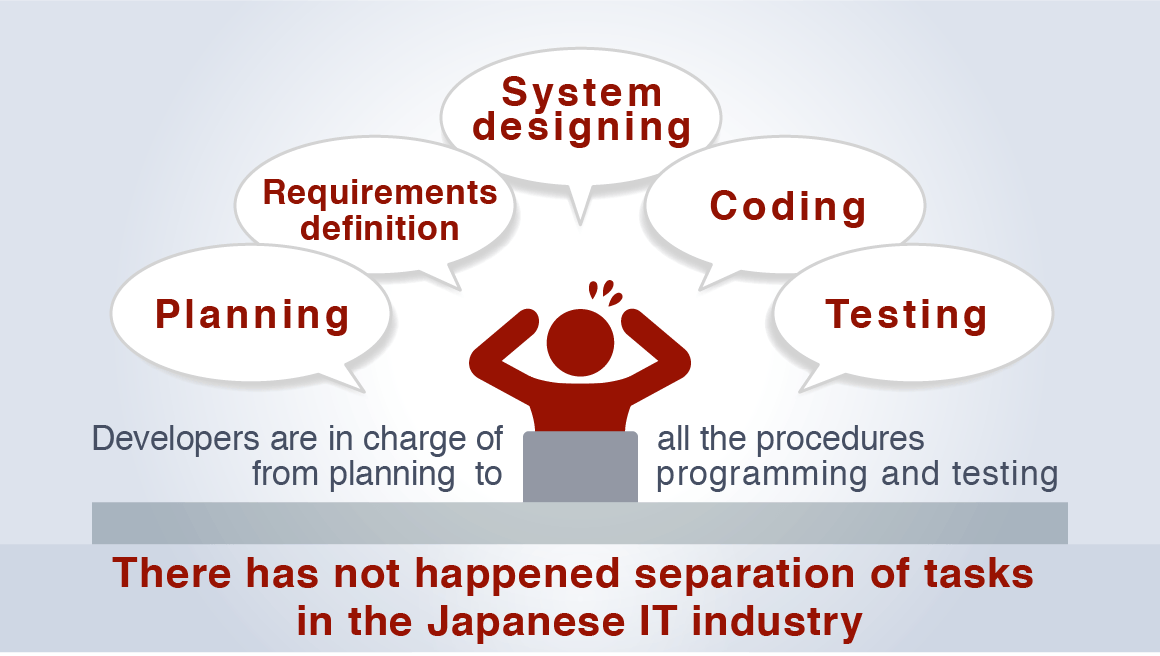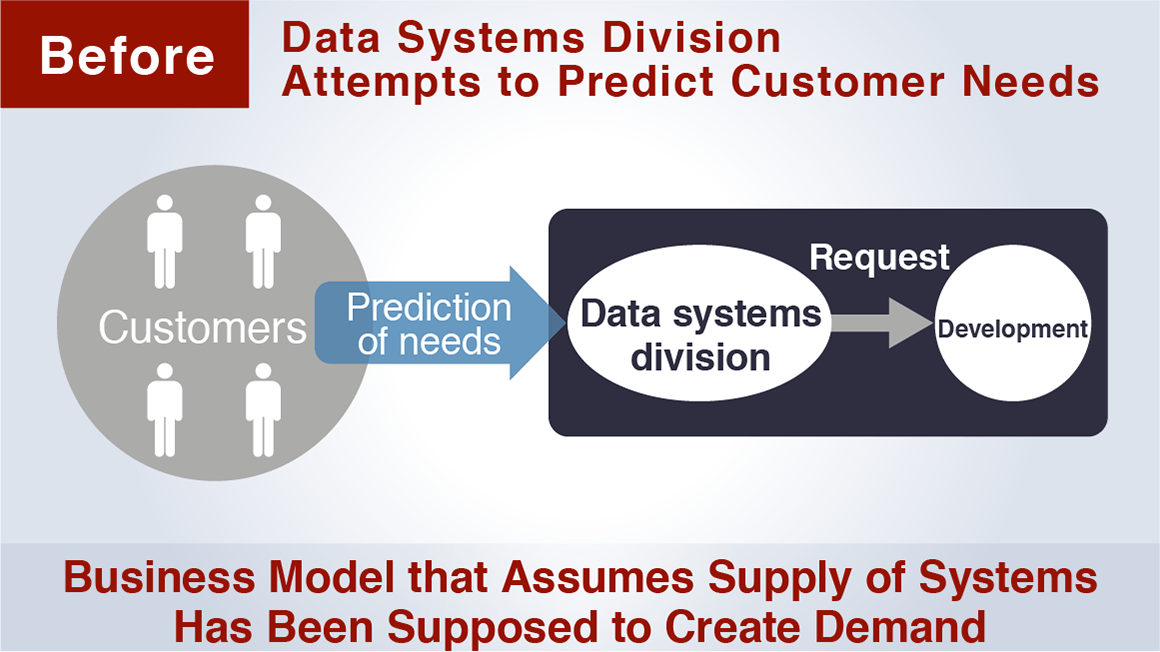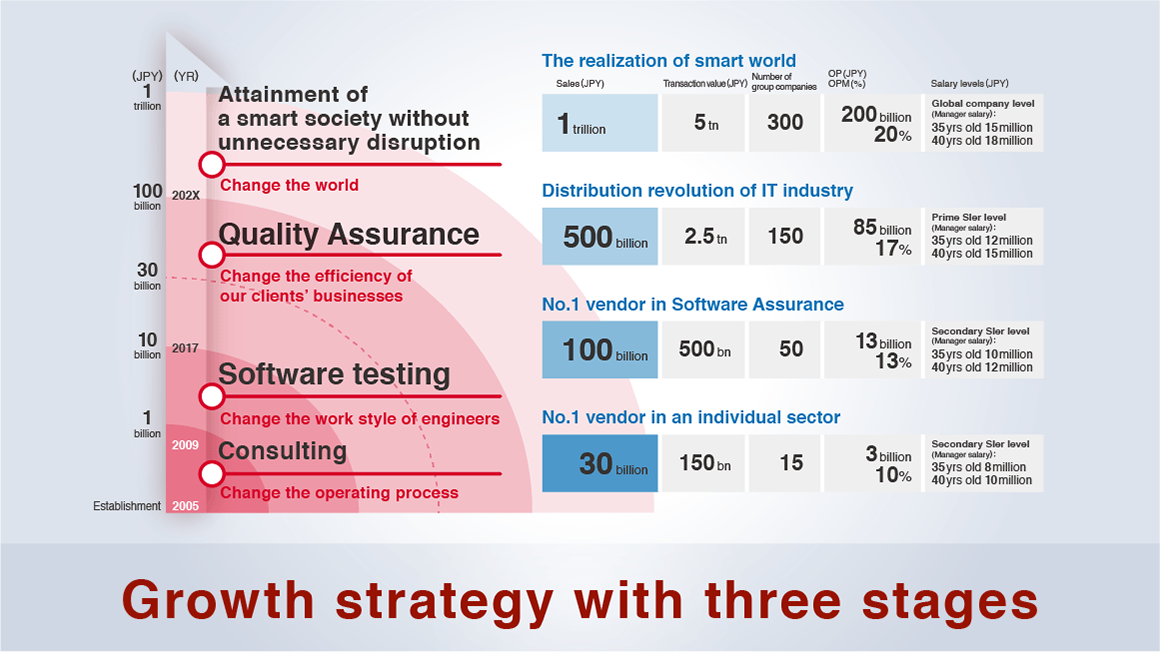For Institutional Investors
The videos and associated information on this page encapsulate basic information on SHIFT, including an overview of our company and our business model. By making such information available here, we hope to facilitate more purposeful discussions when investors take time out of their busy schedules to meet with us. With that in mind, we cordially invite you to read the transcript of the latest business results webcast. For further information, or if you have any questions, please use the inquiries page to arrange a meeting.
Business Results Webcast for Q1 of FY2026 Ended in November 30, 2025
Read the transcript of business Results Webcast for Q1 of FY2026 Ended in November 30, 2025
Video about Our Business
Introductory video to SHIFT’s lines of business, presented by President & CEO Masaru Tange himself. Get to know the basics about SHIFT in just 28 minutes.
(Running time: 28 minutes)
Summary of Our Business
Topics
A categorized summary of the video is also available.
- Three Points in Discussing SHIFT
- Profile of President & CEO Masaru Tange
- Japanese IT Industry Structure and Separation of Testing from Development
- Why Place Your Order with SHIFT?
- Competitors
- SHIFT’s Strengths
- Catalyst for the Testing Business
- Japanese IT Industry Innovation
- SHIFT’s Group Management
- SHIFT’s Growth Strategy
- In Conclusion
FAQ (Search categories)
Answers to questions frequently asked by institutional investors in face-to-face meetings. Please review our FAQ before sending an inquiry.
Click here for FAQ (Search categories) >
Three Points in Discussing SHIFT
Blue Ocean Market

- Japaneses IT industry worth about ¥16 trillion
- Roughly ¥5.5 trillion of that consists of software testing
- Just about 1% of software testing is outsourced
- A market with enormous potential
- SHIFT is the leading company in that software testing market
Recruiting Engineers

- The shortage of engineers is mentioned everywhere
- SHIFT searches among people with no IT industry experience(non-IT staff) to find staff with decent grounding in software testing who can hit the ground running
- That’s why recruiting at SHIFT is going smoothly even amid the shortage of engineers
- This new sort of scheme makes SHIFT one of the rare success stories in recruiting quality human resources
CAT

- We use our own original examination known as “CAT examination”
- We use this test as a filter to recruit those people who are well suited to software testing
- We also use test project support tool developed in house known as “CAT tool”
- We manage accumulated deficiency data to prevent deficiencies during new development, and use CAT tool to manage progress as well as share information and control quality
- SHIFT also has the knowledge accumulated with CAT tool as a quality professional
- SHIFT truly aims to establish the de facto standard in software quality
Profile of President & CEO Masaru Tange
Professional History

Background
- As a student, Tange wanted to build a robotics company in the future, and thus decided to go to a science-oriented university
- What Tange learned at university is to “think for yourself”
- At graduate school, Tange’s professor told him “question even numerical formulae conceived by genius mathematicians hundreds of years ago”
- Through his experiences in university and graduate school, Tange cultivated the abilities to “think for yourself,” “question the consensus,” and “think logically”
Professional History
- Following graduate school, Tange joined Incs Inc.
- Incs was an extremely unique company. Despite a manufacturing industry consulting firm, it also had its own production facilities
- Incs also gained industrywide attention for reducing the production lead time on a mold from two months to two days
- It was Tange who came up with that mechanism
- The tools and methodology he developed to shorten that lead time hugely contributed to growth for Incs
Entry into the IT Industry
- After leaving Incs, Tange founded SHIFT
- Tange brought the knowledge of production and quality management accumulated by Japan’s manufacturers to the growth industry of the IT industry
Japanese IT Industry Structure and Separation of Testing from Development
The Japanese IT Industry’s Distorted Structure

- Such separation is standard in the auto industry
- Separation of tasks and industrialization enable scaling
- Preventing loss of transmitted information is one method of achieving that
- Like the household-based handicraft industry, in the Japanese IT industry planning and programming are things done by oneself, and for some reason separation of tasks has not happened
- Under this distorted structure, there is no horizontal growth but only inefficient vertical growth, i.e. a structure with subcontracting
Separation between Development and Testing

- One person cannot possess all talents
- Industries need to have scalability by dividing up the talents that people have and utilizing them, but the Japanese IT industry has not been able to do that
- People who conduct programming and people who conduct software testing (or have good grounding in testing) have different qualities
- That is why we separate those tasks
Why Place Your Order with SHIFT?
Image Penetration

- When developers do their own testing, things tend to fall between the cracks
- That is the reason why we have asserted that development and testing should performed separately
- The message that SHIFT is for who look for software testing is now penetrating, and the market is taking shape
Factors Driving Orders Placed with SHIFT

- Four factors have been driving growth in orders placed with SHIFT
- 1 In-house testing lacks third-party neutrality
- 2 Testing by development engineers runs up costs
- 3 Testing by engineers reduces motivation
- 4 Development engineers are not experts at quality
Competitors
Segments and Competitors

- The Direction in Which SHIFT is Heading can be Categorized into Three Segments
- 1 Entertainment
Two listed competitors conducting quality assurance in the game industry in Japan - 2 Built-in (software built in to autos and consumer electronics)
Only one listed competitor conducting such quality assurance in Japan - 3 Enterprise (various services and apps including banks, securities, and ERP)
SHIFT is the only player in the enterprise market in Japan
- 1 Entertainment
Unique Characteristics in the Enterprise Market
- The enterprise market is extremely large
- It is crucial to obtain orders as a subcontractor
- Duties are handled on a one-stop basis, from the most upstream processes to downstream processes
SHIFT’s Strengths
People : CAT (Computer Aided Test) examination

- As stated previously, SHIFT has its own original examination (CAT examination) to find and recruit high-quality staff
- Thanks to CAT examination, SHIFT is able to find and recruit members that are three times as productive as standard engineers in testing and are capable of delivering high quality. The pass rate is 6%
Tool : CAT

- As stated previously, CAT is a software testing progress and quality management tool
- Implemented as a cloud-based service as well
- A test project support tool that enables fine-tuned management addressing issues: who causes deficiencies and when; how is the schedule progressing; where is the bottleneck that is preventing the project from moving on to the next stage
Knowledge

- SHIFT stores up knowledge on what kind of deficiencies each environment is prone to
- Putting that knowledge to use enables the prevention of deficiencies ahead of time
Catalyst for the Testing Business
Quality Assurance before SHIFT Launched its Testing Business
- Consulting on quality assurance for a major e-commerce site in 2006 formed the catalyst for launching testing business
- We started out by taking tacit knowledge on quality assurance, standardizing it in a tangible, knowable format, and attempting to automate it in IT
- To that end, we interviewed on-the-ground members conducting tests, and as we were attempting to standardize their answers, things took an unexpected turn
- We asked on-the-ground members what they were doing to secure quality, but no matter how many times we asked, we never got a clear answer
- We discovered that, before SHIFT expanded into the testing business, most deficiencies were basically detected by accident
- If that weren’t all, none of the people working at the time seemed to enjoy themselves
Catalyst for Full-Fledged Launch of Testing Business

- A serious problem, that we truly feel is worthy of reform
- Testing takes 40% of development
- Streamlining that 40% would improve Japanese IT industry
- For Japanese, who place such priority on quality, assuring quality is the most suitable job
- SHIFT determined that creating such a scheme is important and that creating a company that focused on that scheme would be useful for society.
- That is why SHIFT expanded into the testing business
Japanese IT Industry Innovation
What SHIFT is Aiming for

- In spite of the Japanese IT industry’s ¥15 trillion worth, salaries and unit prices have not grown
- This is no individual’s fault. It is the fault of an incomplete industry structure
- If this incomplete industry structure could be reformed, and the people who produce results are properly evaluated with pay raises, there might be no need for two millions of engineers.
- The kind of structure that makes the industry better, that raises pay, that improve compensations. That is the kind of structural reform SHIFT is aiming for
- Japanese IT industry has not property rewarded its engineers in terms of compensation or job satisfaction. SHIFT seeks to fill that gap
Tag Line

- There is no hope for any business that does not begin with the premise of providing added value
- We offer a new tag line: “We replace their unreasonable consensus(*)”
- That said, replacing the consensus is not our objective
- To make the world better, we make non-consensus views “smart” and make changes to consensus views so as to improve them
* Please kindly note that the tag line is literally translated into English. Therefore, there might be changes in the future to reflect what we really meant in it.
Smile Curve

- Conduct business starting from the points on the curve, where it has bigger gap between customers needs and industrial structures
- The biggest points are during at upstream and downstream stages
- SHIFT’s mission is to capitalize on the edge of this smile curve
Apps that Get Discarded

- Apps are made around the world
- But the only apps with viable business potential are those that rank in the Top 100
- Just like the problem with food, tons of apps get developed and tons of app get tossed away
- Developers’ salaries may also be cut if apps they develop do not sell well, regardless of how much effort was put into development
- So how can SHIFT help prevent developing apps that get discarded?
- No one would touch apps with low quality UI or UX
- No matter how well games are developed, they won’t reach their users unless there are marketed well
- The “last one mile” is far more crucial than development as a whole
- To prevent these kinds of incidents during upstream processes, we believe it is much more important to embrace the users, involve the users, and conduct development together
- In other words: Don’t waste engineer resources; don’t generate disgruntled people
- That is the kind of company that will achieve ¥1 trillion in net sales and market capitalization
SHIFT’s Group Management
Current and Future Group Companies

- SHIFT’s corporate target: ¥1 trillion in net sales We are acquiring the necessary content (group companies) to attain that goal
- Our group companies include development companies, security companies, design companies and A/B test tool companies
- We will continue to expand our group to advance our goal of becoming a group-company committed to create the kind of services demanded by our customers
Traditional Development Style

- Because traditional development methods fail to comprehend what customers want, they depend on information system division to predict customer needs and develop systems accordingly
- For example, banks: information system divisions determined what kind of services online banking and ATM customers desired and made development requests accordingly
What SHIFT Helps With

- For example, these days, most customers prefer using their smartphones to going to ATMs
- Information systems divisions do not have a complete grasp of all specifications
- The customer has a complete grasp of specifications, and the customer holds the answers
- That is why the traditional structure fails to work properly
- Developers depend on the information systems divisions. That’s why companies fail to develop saleable products and fail to reach their users
- At SHIFT, we employ our entire group to provide mechanisms that reach their users
- We eschew the philosophy that “if you make the system, it will sell.” We help sell experiences because experiences are what the users desire
- Creating systems and helping to sell experiences are completely different business models
SHIFT’s Growth Strategy
Growth Stages

- SHIFT aims for different stages of net sales targets: ¥100 billion, ¥500 billion, and ¥1 trillion
- Step 1.
Become No.1 in the software testing industry - Step 2.
Become the No.1 structurally fabless company and the No.1 systems integrator company - Step 3.
Become a company that adds service and marketing to provide user experience assistance such as UX
- Step 1.
¥100 billion in net sales
- Japanese companies with ¥100 billion in net sales means most people or businesses in Japan have either used your services or heard of your company’s name
¥500 billion in net sales
- SHIFT’s customers often tell us that we are the most insightful regarding engineer companies, since we provide testing for all kinds of services
- We are also asked to refer engineer companies
- Some customers say they attempted to send requests to system integrators, but had misgivings
- That is where and why SHIFT gets involved from the upstream stage
- For example, we referred the top four vendors to develop the kind of systems desired by the customer
- SHIFT conducted acceptance test of the products those four companies made, integrated them, and delivered them
- In that sense, it is as if “creator” companies will join SHIFT Group
- The ability to “create” leads to net sales of ¥500 billion
- Proceeding as a fabless company through our group affiliates rather than our own engineers
In Conclusion
Handling Quality Assurance for the World

- In this day of global development and global sourcing, SHIFT is determined to provide the world with made-in-Japan quality as well as safety and security
- The Japanese are often said to be most demanding in the world in terms quality
- Software that satisfies Japanese customers will most likely satisfy global customers
- Spreading quality assurance to the world, starting with Japan
- Such a world is commonly thought of, and we believe SHIFT will make it a reality
- SHIFT hopes to be a company that delivers that level of quality

